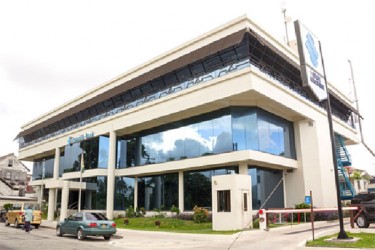A second commercial bank has signed on to the Low Carbon Micro and Small Enterprise Develop-ment Project (LCMSEDP) being administered from within the Ministry of Tourism, Industry and Commerce, paving the way for significantly enhanced access to lending for medium and small enterprises registered with the project.
Derrick Cummings, Chief Executive Officer of the Small Business Bureau (SBB), the body established under the 2004 Small Business Act and which administers the project told Stabroek Business in an interview earlier this week that Republic Bank is now on board. That entity has joined the Guyana Bank for Trade and Industry (GBTI) as local banking institutions that will offer loans to eligible business ventures under the project’s collateral guarantee umbrella. Under this arrangement, the SBB will guarantee up to 40 per cent of the collateral requirements of the commercial banks, up to a maximum of $12 million for loans. “What this means is that our uptake will now significantly increase in terms of the mutual guarantee and interest subsidy aspects of the project,” Cummings told Stabroek Business.
Meanwhile, according to Cummings, of the 30 projects referred to GBTI for possible lending, so far five are expected to secure loan approvals shortly. “The startup of the process has not been without its challenges. In some cases there have been issues with persons producing the relevant documentation in order to satisfy the bank’s requirements. What both the SBB and the commercial banks are seeking to do is to ensure that the project is administered professionally. “Apart from the procedures that fall under the SBB there are also the banks’ rules and procedures to be satisfied,” Cummings said.

According to the SBB’s Chief Executive Officer both the GBTI and Republic Bank have set aside “significant sums of money” for lending under the project. He said the areas of entrepreneurship that had come into focus for loans and grants up to this time included agriculture and agro processing, tourism, art and craft, furniture and hollow block manufacturing, all projects that qualify under the low carbon strictures set out in the project.
The LCMSEDP was launched with much aplomb by President Donald Ramotar in October last year and Cummings told Stabroek Business that while the disclosure that Republic Bank was not “on board with the project” was a significant one, a number of other initiatives had been undertaken since the launch of the project late last year. “Effective business management is a critical component of this project and we have already facilitated training in record keeping and business management,” he said. He named the Kuru Kuru Cooperative College and EMPRETEC as two of the entities involved in the training under the technical skills training component of the project.
Under the grants component of the project, persons who do not qualify for loans because of perceived risks will be eligible for grants and Cummings told Stabroek Business that of the more than 200 grant applicants interviewed by the Bureau 80 “have moved forward” and will now be engaged by the Grants Committee. “The procedure here is that those projects considered to be eligible for grants will be put before a Grants Committee comprising representatives of the Small Business Council, the Bank of Guyana, the Ministry of Finance, the Project Management Office of the Office of the President and the Small Business Bureau. Serious consideration for grants will require that persons submit detailed business plans and we have been supporting them with training in that regard. More than that there will be visits to actual project sites to evaluate what is on the ground,” Cummings said. He said that the first set of grants could be assigned as early as the end of March.
Cummings said he estimates that between 3,000 and 4,000 potential beneficiaries had already “signed up with the Bureau and that an outreach programme covering most regions of the country had been undertaken to ensure that small businesses across the country secured an opportunity to benefit from the project.”




